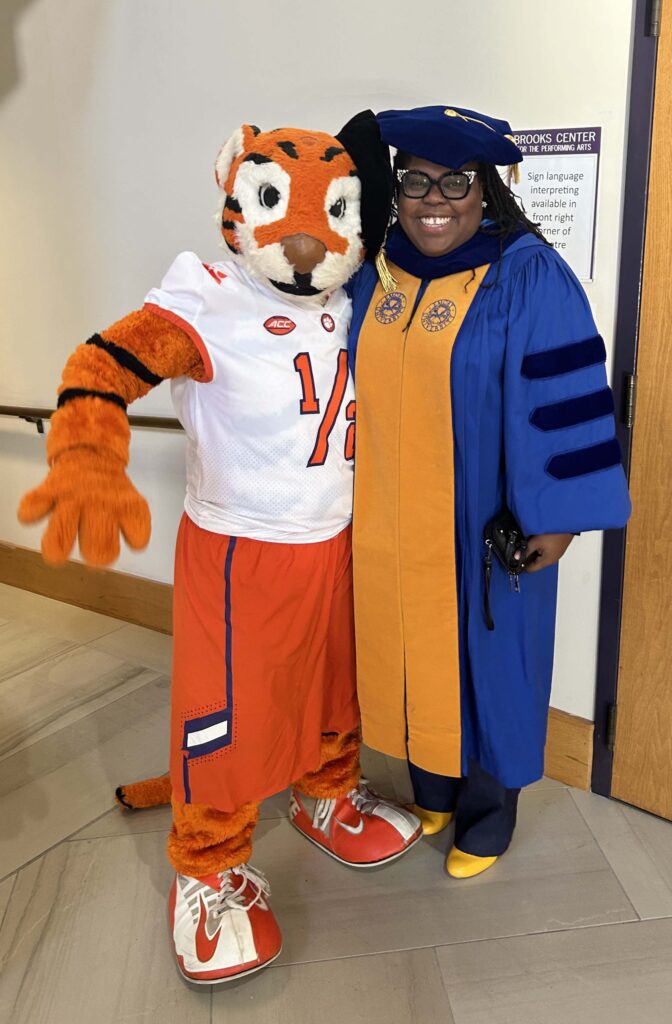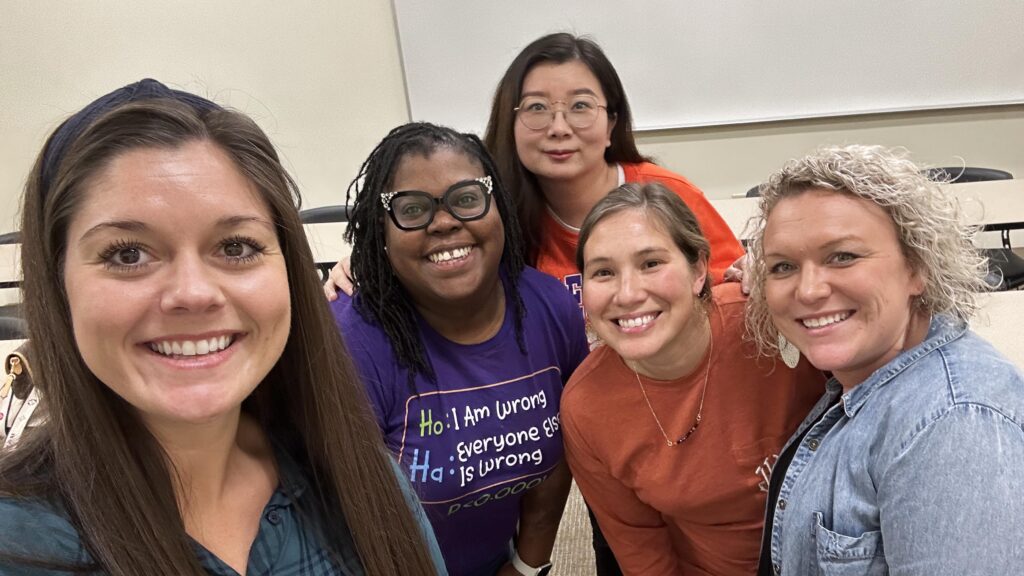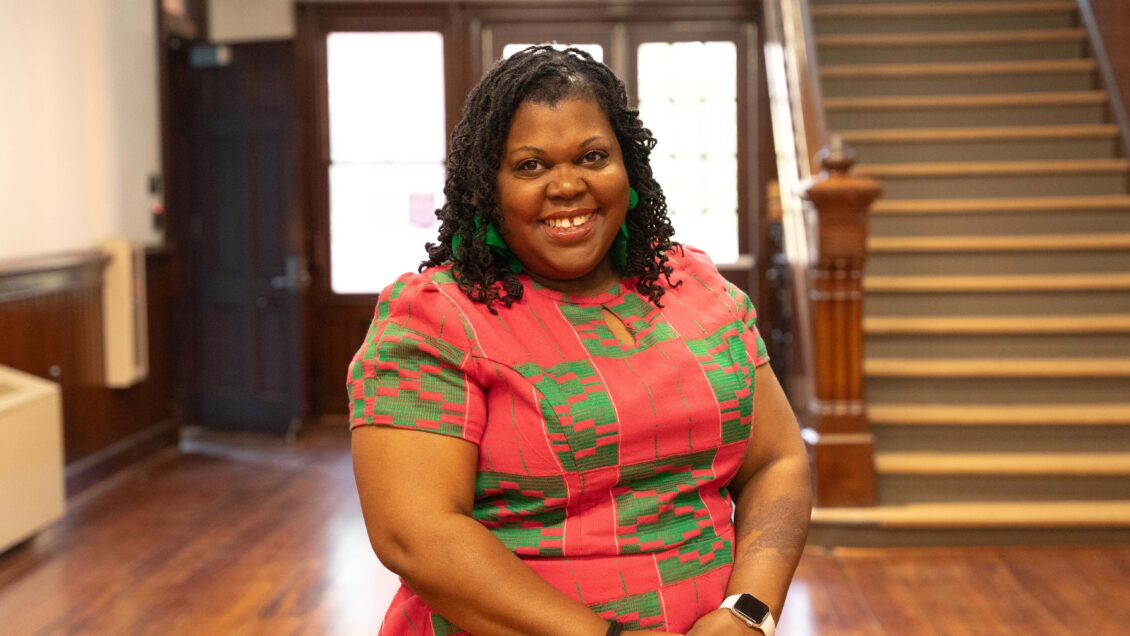Brandi Hinnant-Crawford is an associate professor in the Department of Educational and Organizational Leadership Development. She joined the Clemson University College of Education faculty in Fall 2022, and her scholarship focuses on just and inclusive policies and practices for marginalized students across the P-20 pipeline as well as how research, particularly improvement science, can be leveraged as a methodological tool to catalyze justice.
We caught up with Hinnant-Crawford to discuss her teaching philosophy and her approach to teaching adult students, particularly those interested in becoming researchers or using research methods intensively in their careers.
What is your teaching philosophy?
When I first wrote my teaching philosophy in my teacher education program, I said my philosophy was simple: “teach the child—then teach the subject.” As my career has evolved and I have shifted from teaching high school English to teaching doctoral students how to improve schools, I still see the student as much more important than the content.
bell hooks challenged educators–specifically professors–to teach in a way that cares for their students’ souls, and that is what I try to do. For me, caring for their souls requires both warmth and demand. Caring for my students’ souls means seeing their full humanity, meeting them where they are, extending love and grace, and recognizing that their varied experiences, backgrounds and knowledge contribute more to the classroom than I do. Our classroom is a shared space of meaning making, where we make space for vulnerability, for being wrong and for learning and trying things without judgement.

While caring for my students’ souls, I cannot neglect the state of education. We know some schools do not serve all, especially Black, Brown, indigenous, neurodivergent, multilingual, queer and poor children well. My students are current and aspiring teachers and leaders, and they all have the opportunity to change the way schooling takes place.
Teaching teachers and school leaders is hard because they know what good teaching looks like, but more so because it is heavy work. Teaching educators is much like teaching medical doctors; you are preparing people to care for the lives of others. Clemson Elevate says we seek to transform lives, and I know my students have the power to transform the state of education; it is my duty to cultivate their skill, will and courage to do so. I take developing skill, will and courage seriously—I expect excellence—but I am committed to helping each student meet my expectations. Regardless of whether I am teaching statistics or leadership theory, my teaching is essentially creating an environment that cultivates critical pragmatists: those who see problems, co-design solutions with the communities they serve and ensure educational opportunities are in reach for every child.
Why do you love teaching?
I love teaching because I believe in the magic that resides within people. Asa Hilliard once said he had never encountered children of any kind that were not geniuses. He went on to say that there is no mystery in how to teach. You just treat children like human beings, and you love them. I believe the same is true for teaching adults, but adults have been through life and often have been led to believe they are not geniuses. So teaching is simply helping individuals tap into the genius they possess. I love being able to witness up close the epiphanies, the excitement and the power that is unleashed when children and adults discover their own gifts.

Describe an effective approach you use in the classroom.
One of the most effective approaches I take into my classroom is making use of student interests and prior knowledge. This technique is evident in the research methods courses I teach. I realize that many students enter research classes with a great deal of apprehension, so my first goal and objective is to make inquiry relevant to their own priorities.
By using their interests, I can teach content that makes them informed consumers and producers of research. When teaching new methods, I try to get students to collect their own data or use data from their organizations because just like with reading a text, “the more a reader knows about the domain of a text, the more likely the reader will comprehend and learn from the text.” When they apply learning to their own settings, their understanding of the methods are more likely to “stick.”
What is the most challenging aspect of teaching for you?
Keeping up grading is the most challenging aspect of teaching for me. After nearly 20 years in education, I still feel like I am constantly behind. What makes this ironic is that I fully believe feedback is critical to learning. I teach improvement science, and the science of improvement is all about developing feedback loops to increase your learning. Yet I am still constantly behind.
What do you enjoy doing when you are not teaching?
When I am not working, I love being fully present with my family. This can be going to cheer on the Clemson Tigers at a basketball game, it can be playing “Just Dance” or “Mario Cart” on the Nintendo Switch with my kids (and no, I do not let them win), or watching a movie or TV show like “Abbot Elementary” (my favorite) or “Young Sheldon.” I recognize my twins are growing up so much faster than I anticipated; any moments I get to spend with them that are unorganized where we can talk, snuggle or be present with each other brings me more joy than anything else. I also love a good dance party and the beach.
Get in touch and we will connect you with the author or another expert.
Or email us at news@clemson.edu

